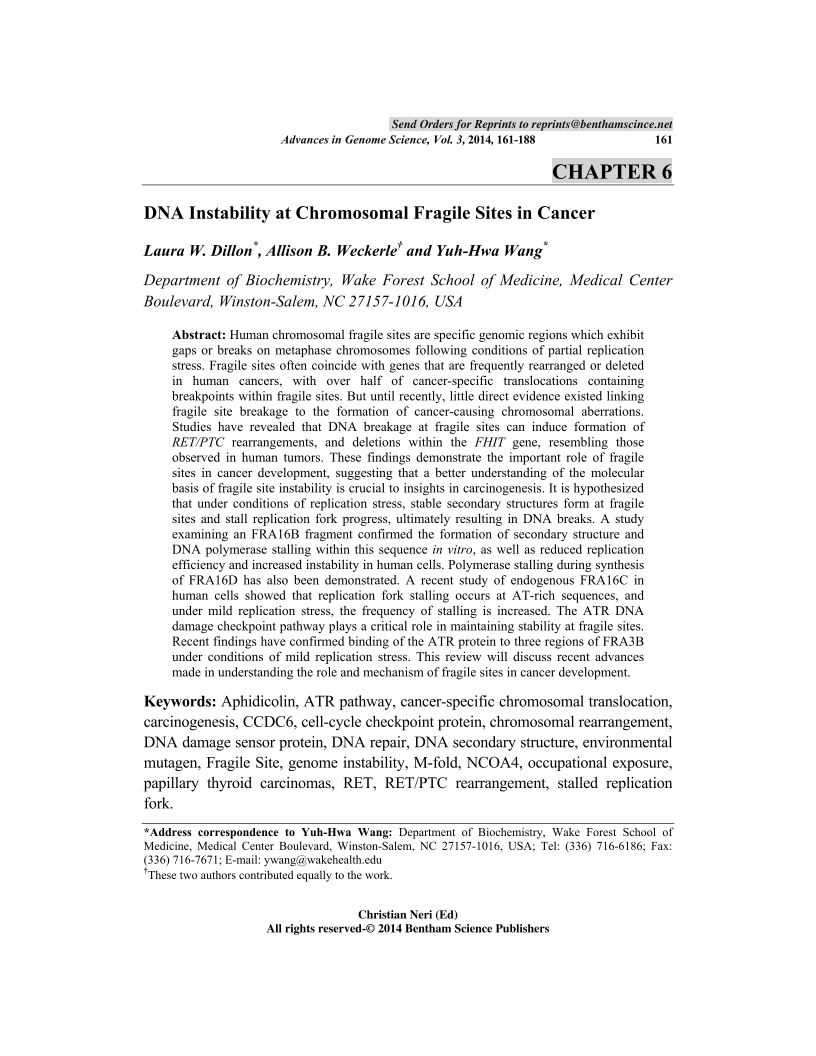DNA Instability at Chromosomal Fragile Sites in Cancer

- Authors: Laura W. Dillon, Allison B. Weckerle, Yuh Hwa Wang3
-
View Affiliations Hide Affiliations3 Department of Biochemistry, Wake Forest School of Medicine, Medical Center Boulevard, Winston-Salem, NC 27157-1016, United States
- Source: Keeping up with Genome Sequence and Expression , pp 161-188
- Publication Date: August 2014
- Language: English
DNA Instability at Chromosomal Fragile Sites in Cancer, Page 1 of 1
< Previous page | Next page > /docserver/preview/fulltext/9781608058204/chapter-6-1.gif
Human chromosomal fragile sites are specific genomic regions which exhibit gaps or breaks on metaphase chromosomes following conditions of partial replication stress. Fragile sites often coincide with genes that are frequently rearranged or deleted in human cancers, with over half of cancer-specific translocations containing breakpoints within fragile sites. But until recently, little direct evidence existed linking fragile site breakage to the formation of cancer-causing chromosomal aberrations. Studies have revealed that DNA breakage at fragile sites can induce formation of RET/PTC rearrangements, and deletions within the FHIT gene, resembling those observed in human tumors. These findings demonstrate the important role of fragile sites in cancer development, suggesting that a better understanding of the molecular basis of fragile site instability is crucial to insights in carcinogenesis. It is hypothesized that under conditions of replication stress, stable secondary structures form at fragile sites and stall replication fork progress, ultimately resulting in DNA breaks. A study examining an FRA16B fragment confirmed the formation of secondary structure and DNA polymerase stalling within this sequence in vitro, as well as reduced replication efficiency and increased instability in human cells. Polymerase stalling during synthesis of FRA16D has also been demonstrated. A recent study of endogenous FRA16C in human cells showed that replication fork stalling occurs at AT-rich sequences, and under mild replication stress, the frequency of stalling is increased. The ATR DNA damage checkpoint pathway plays a critical role in maintaining stability at fragile sites. Recent findings have confirmed binding of the ATR protein to three regions of FRA3B under conditions of mild replication stress. This review will discuss recent advances made in understanding the role and mechanism of fragile sites in cancer development.
-
From This Site
/content/books/9781608058204.chapter-6dcterms_subject,pub_keyword-contentType:Journal -contentType:Figure -contentType:Table -contentType:SupplementaryData105

